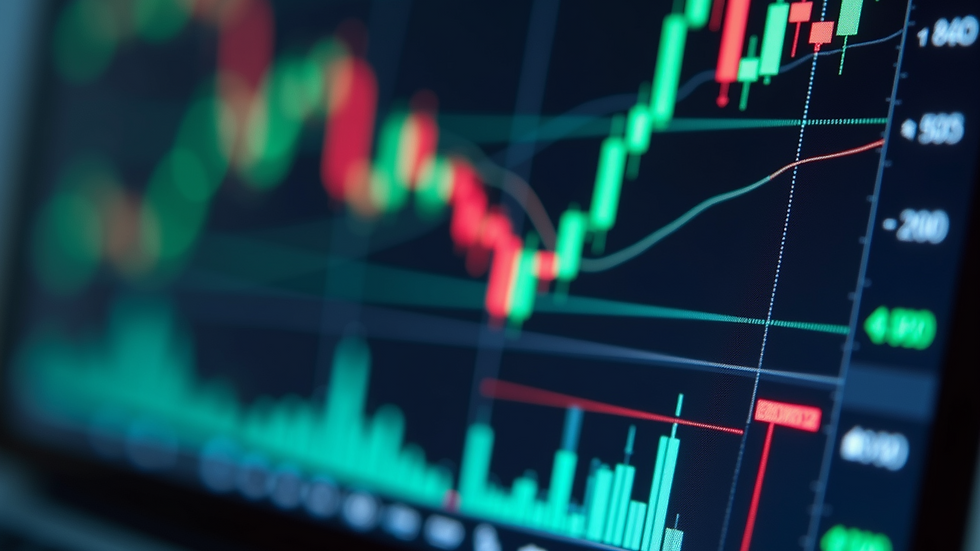Trade the News: How to Seize Market Opportunities
- forex368

- Oct 18, 2023
- 5 min read
In an era where information travels at light speed, staying ahead of the curve requires more than just luck. It requires strategy—more specifically, a strategy centred on trading the news.
In today's fast-paced financial markets, news is not just information; it's a trading opportunity.

Whether you're a retail trader or an institutional investor, knowing how to capitalise on news events can significantly impact your trading portfolio.
The Flashpoint: Middle East Conflict and Market Uncertainty
Imagine this: News breaks of an escalating conflict in the Middle East. Within moments, oil prices shoot up, spurred by fears of potential supply disruptions.
It's not just oil; safe-haven currencies like the Swiss Franc gain traction as investors seek stability. Gold, the classic safe haven, also sees a surge.
This rapid market movement epitomises how financial markets loathe uncertainty, often prompting a risk-off sentiment that triggers sell-offs in more volatile assets.
"In times of crisis, the wise build bridges while the foolish build barriers," says financial analyst Peter Lynch. Indeed, savvy traders see these moments as bridges to potential profit, not barriers."
The Pulse of the Market: Trading the News

Why do fundamentals effect the market?
Interest Rate Changes: Central banks adjust interest rates to influence borrowing, investing, and spending, significantly impacting currency valuation.
Inflation Reports: Higher inflation usually leads to a decrease in a currency's purchasing power, affecting both the stock and forex markets.
Employment Data: Job reports and unemployment rates serve as indicators of economic health, influencing both equities and currencies.
GDP Growth Figures: Gross Domestic Product data provide insights into an economy's performance, affecting market sentiment and asset prices.
Geopolitical Conflicts: Events such as wars or diplomatic tensions can cause market volatility, driving investors toward safe-haven assets.
Corporate Earnings Reports: Strong or weak earnings can drastically affect a company's stock price and influence overall market indices.
Trade Balance Data: Surpluses or deficits can indicate an economy's strength or weakness, affecting its currency and stock market.
Fiscal and Monetary Policy Announcements: Decisions on tax rates, public spending, and money supply can cause market fluctuations across all asset classes.
Commodity Price Fluctuations: Changes in the prices of key commodities like oil and gold can reverberate through forex, equities, and bond markets.
Market Sentiment Indicators (Consumer Confidence, Business Surveys): These metrics offer a snapshot of market psychology, often signalling potential future market movements.
So, how do we approach these opportunities?
Manual Trading: The Tactical Approach
Manual trading is all about vigilance and timing. Here, you're not just waiting for the markets to move; you're anticipating them.
If a corporate giant is set to announce its quarterly earnings, a manual trader might buy the stock ahead of the announcement, speculating on a favourable outcome.
"In trading and investing, it's not about how much you make but rather how much you don't lose." – Bernard Baruch, financier and statesman
Automatic/Program Trading: The Strategic Machine
If you're looking to minimize human error and maximize efficiency, algorithmic trading could be your go-to. Program trading utilises complex algorithms to execute trades based on predetermined criteria, without human intervention.
Buy the Rumour, Sell the News: The Speculator's Game
This classic adage advises traders to anticipate an event and act before it comes to fruition. It's like buying a ticket before the lottery numbers are announced—risky but potentially rewarding.
The Social Media Impact: New-Age Catalyst
From Twitter storms to Reddit forums, social networks have emerged as powerful platforms for retail traders. The rise of meme investing demonstrates that viral discussions can lead to rapid price movements.
A Glimpse into Vantage Markets Global: Your Brokerage of Choice
When it comes to trading the news, the importance of a reliable broker cannot be overstated. That's why we personally recommend Vantage Markets Global. Here are some compelling reasons why:
Reputable Licenses: Regulated by four esteemed authorities, ensuring utmost security and credibility.
Free Trading Signals: Regardless of your account type, Vantage offers free signals to guide your trading decisions.
Bonus Policy: Their attractive bonus scheme can significantly boost your trading capital.
Flexible Leverage: Offering up to 500:1 leverage, this broker accommodates various trading styles.
Synergy: Combining Fundamental Analysis with Scalping
If you ask us which strategy works best for us, we'd say it's a blend of fundamental analysis and scalping. Here's how it synergises:
Trend Following: Identify the dominant market trend and trade in that direction.
Fundamental Analysis: Use economic data and news events to predict long-term currency movements.
Scalping: Target small price changes to accumulate small profits over numerous trades.
"The stock market is a device for transferring money from the impatient to the patient." – Warren Buffett Real-World Example
Following a data release in the US, it was evident that the USD was weakening while Gold was strengthening.

Using a 1-minute candle strategy, we entered trades at the bottom of the Bollinger Band and exited at the middle band, repeatedly until the upward trend concluded.
Actionable Steps
Education: Before anything else, arm yourself with knowledge.
Pick Your Strategy: Whether it's manual trading or scalping, stick to a strategy that aligns with your goals.
Choose the Right Broker: We recommend Vantage Markets Global for its reliable services and trader-friendly policies.
Stay Updated: Follow credible news sources and market analysis to act promptly on trading opportunities.
Trade the News
To Trade the news offers a plethora of opportunities for those who understand its nuances.
From manual and algorithmic trading to capitalising on social media trends, the avenues are diverse.
The blend of fundamental analysis with scalping strategies has proven particularly effective for us. As with all investments, however, it's essential to weigh the risks involved and proceed with caution.
Risk Disclaimer: As with all investments, your capital is at risk. Investments can fall and rise, and you may get back less than you invested.
Call to Action
Ready to seize market opportunities like never before?
Join the Champ Profit community and gain access to invaluable insights, real-time rates, and unbiased broker reviews. Let's navigate the complex world of trading, together.
Index
Manual Trading: Actively monitoring and trading based on market events.
Algorithmic Trading: Using computer algorithms to execute trades.
Scalping: A strategy focusing on small price movements.
Fundamental Analysis: Analysing economic data to predict long-term market movements.
Bollinger Bands: A technical indicator used for trend analysis.
Follow us on Twitter, Telegram, or WhatsApp for up-to-the-minute trading opportunities.
As with all investments, your capital is at risk. Investments can fall and rise and you
may get back less than you invested.












